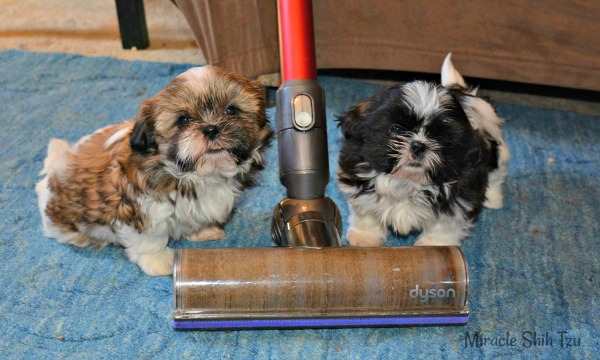- Home
- Breeding Dogs
Breeding Dogs: Skills, Knowledge and Training Needed
by Janice Jones |Last Updated 05-04-2021
This is the second in a series about breeding a Shih Tzu dog. We will look at the skills, knowledge and training needed to be successful. We'll also look at the rewards this job brings.
If you haven't read the first article, may I suggest you start there.
Where does your passion lie? Breeding dogs can be very hard work, long hours, both emotionally rewarding and emotionally draining, It can also be profitable or not. This is one of those businesses, however, that require a considerable amount of passion.
What is Passion? Merriam Webster defines Passion as an
"intense, driving, or overmastering feeling or conviction"
Passion is what grabs you when you wake up in the morning and when you go to bed at night. It is what is constantly on your mind. You need that sort of zeal and commitment to be successful in dog breeding.
The most successful dog breeders have a belief that they can make excellent puppies, that they can better the breed. They have an attitude and confidence that what they are doing is important and that they are good at what they do. Finally, they have the motivation to keep going even when things look dismal.
They don't let disappointments get them down. The brush off insults by the so called, Animal Advocates, and they don't stay sad too long when things get very emotionally difficult.
Why do You Need Passion for Breeding Dogs?
The Naysayers...
One of the first things you will encounter are all the well-meaning animal lovers who hate breeders. They are a very vocal group.
The Need for hands on learning
Even if you are starting a breeding business, unless you have met many breeders who are willing to help you, it may be hard to sell the puppies. Even show breeders have difficulty selling the pups they do not plan to keep. It takes a while to build up a reputation, and savvy consumers are likely to tell that you are a novice. Even the negative term, “backyard breeder” may be slapped on your reputation.
The Lack of Educational Resources
You won’t find a 2 or 4-year college program that prepares you to breed, but you can still learn much before you breed your Shih Tzu.
After all, most professions require some training. It is unlikely that you will acquire everything you need to know right away. Consider that you will be a lifelong learner if you do decide to go into the breeding business. You will want to keep up in the field as things change quickly, scientists make new discoveries, experts develop new techniques.
This group of articles will help you manage all the issues that arise as a breeder.
Skills and Knowledge, You Will Need to Breed Your Shih Tzu
If you are serious about starting a breeding business rather than just mating your female to the dog down the street, there are some skills you will need to learn. Breeding dogs require a solid knowledge base in a wide variety of fields. Here are just a few areas worth investigating.
- Genetics
- Nutrition
- Breed Standard
- Health concerns of breed including testing
- General Veterinary Medicine
- Reproductive cycle of females
- Breeding process
- Canine Pregnancy and Whelping
- Care of Newborns
- Dog development
- Recognizing Problems
- Grooming & Training
- Photography and videography
- Web design, SEO and the myriad other skills required to operate a website
- Social Media Outlets
- Advertising / Marketing
- Business bookkeeping, licensing, zoning regulations, sales agreements, and other business-related skills
- Requirements for record keeping and recording for AKC
And, if you do decide to go into the business of canine reproduction, additional skills will be necessary.
Will you be showing your dogs or participating in a dog sport? If so, you will develop different skills in addition to those below. If your goals involve breeding to produce healthy, happy, well-adjusted puppies, you will still need some skills to advance.
Personal Quality of Dog Breeders
Many personal qualities are shared by breeders. Look at this “job description” and ask yourself how many of these traits describe you.
- Have an Entrepreneurial spirit
- Don’t mind getting down and dirty
- Have a healthy stomach for dealing with bodily fluids (not yours, the canine varieties)
- Have a deep curiosity about science
- Patience
- Enjoy being around dogs
- Have sufficient personal energy and health
- Have excellent oral and written communication skills
- Have a strong desire to continue learning something new each day
- Don’t mind giving up personal or family time if necessary
- Have a flexible schedule that will allow for the unexpected
- Have the motivation to figure out things for themselves
- Ability to work alone – most breeders are not loners, but the work demands that they won’t have constant co-workers
Dog Breeders Wear Many Hats
At last count, Breeders wear at least 22 and probably many more hats. Breeding dogs requires skills in these areas and many others.
1. Sales Person
2. Doggie Obstetrician
3. Neonatal nurse
4. Veterinary Technician
5. Janitor
6. Marketing Expert
7. Photographer
8. Videographer
9. Webmaster
10. Social Media Guru
11. Counselor
12. Trainer
13. Dog Groomer
14. Nutrition Expert
15. Dog Expert
16. Researcher
17. Biologist/Geneticist
18. Scheduler
19. Records Keeper
20. Buyer
21. Negotiator
22. Bookkeeper/Accountant
23. Teacher/Instructor
If you have read this far, you are probably someone who has given some serious thought to starting their own breeding business and are not scared by the list of qualifications.
People come from all walks of life, all experience levels, all ages, and all levels of education. The good news is that most breeders will excel in many of these areas but not all.
The most successful breeders, just like al business owners either know how to do a job themselves, or who to call to get help. They are a very resourceful group of people.
They are also a group of very caring and helpful people, but also know how to be tough and thick-skinned. This is not an occupation without its controversies, and most breeders will encounter many different types of people, from eager, happy buyers to animal activists ready to put you out of business.
If you have decided that you do want to breed your Shih Tzu, don’t miss the next article in this series, Reproductive Cycle of the Female/Dame/
Can You Make Money Breeding Dogs?
Most Hobby Breeders that participate in dog sports such as agility, obedience, or confirmation will tell you that they do it because they love dogs and choose to use their free time in the company of canines.
Hobby breeders may or may not have a full-time job or other streams of income. This group is the least likely to admit they do make money.
For breeders who depend on their dogs for the primary or secondary income, they do not deny that breeding dogs can be profitable.
There are several ways that breeders can make a decent living. The sale of puppies is apparently the biggest source of revenue, but there are other ways to add to that income.
1. Sale of Puppies
2. Stud Service
3. Boarding and/or grooming/training, or dog walking
4. Sale of dog products
5. Income from affiliate income from hosting a website
6. Sale of eBooks and other personal products
7. Rehoming of retired adult dogs
My Online Story Including My Breeding Business
It's not a get rich quick scheme but if you do it correctly and ethically, you can make money. View this YouTube video to learn more about how I make money and how you can too. If I can do it, anyone can do it.

What's the Bottom Line for Breeding Dogs?
The net income obtained from breeding dogs depends on at least 5 factors:
1. The number of adult female dogs
2. The frequency you allow them to mate
3. The size of the litters
4. The price you can command for each puppy
5. The cost of your expenses.
Let’s look at each one individually.
The Number of Adult Breeding Female Dogs
You can have a very successful breeding program without even purchasing a stud, but you will need one or more female dogs. Your initial foundation stock can be a significant business expense and a significant decision.
Purchasing the best dogs, you can afford will make a huge difference in your overall future income. If you are lucky enough to purchase a champion or champion sired puppy, your puppies will command a bigger price tag.
Most new breeders may have a hard time convincing a breeder to sell their Grand Champion. When this is not possible, the next best option is to find the best puppy you can afford.
What is the best puppy?
If you are familiar with the breed standard, you will develop an eye for how a puppy should look. You will also need to calculate shipping costs into the ultimate price of the puppy and sales tax.
If you want to offer puppies that can be registered with large agencies such as the AKC (American Kennel Club), KC (Kennel Club in the UK), CKC (Canadian Kennel Club or FCC (Fédération Cynologique Internationale) depending on where you are in the world. If your puppies cannot be registered, you may not be taken seriously by anyone other than strictly pet buyers.
Buying a puppy is easier than purchasing an adult breeding female. Most adult dogs are only available if the breeder is retiring or needs to downsize quickly. Some may be trying to sell you an adult that doesn't fit into their breeding program.
Finding a puppy is easier because there is a bigger selection from which to choose from, but remember that the puppy will need to grow to adulthood and obtain at least their second cycle before mating.
That means you will be waiting a year or more before breeding dogs will be possible. All the costs of that puppy purchase, vet care, food, toys, supplies and everything else will need to be absorbed before there is any chance that you will see any income.
How many adult females can you afford and care for and between matings?
There is not an ideal number of females so you will need to decide for yourself how many you can handle. When making this decision, consider how much time you will have to devote to each dog (feeding, training, grooming, caring and loving/playing with each dog).
The Frequency of Mating
There is a wide range of options about the frequency of matings. Many dog advocates will tell you that most dogs are bred too frequently.
They usually base their opinion on what they would consider being appropriate for a human having a baby. Most scientists and reproductive veterinarians will tell you that there is no evidence that breeding more frequently and even at every heat cycle causes any problems.
Breeding decisions should be made based on the health of the female. There is no reason that very healthy girls can mate at each heat cycle. There is, however, plenty of opinions about frequency of matings. Most will agree that a girl that has reached her first heat cycle is too young to mate. Breeders will decide to arrange a mating during the second or third heat cycle.
From there, whether you decide to mate at each cycle after that, every other cycle, or chose to breed two cycles and rest one cycle. There are merits to all three options but should be a personal decision based on the health of the girl.
The Size of the Litter
Most breeds have established an average number of puppies per litter. In the Shih Tzu breed, a very healthy Shih Tzu mom can produce between 4 and 6 puppies. There are many variables that determine the size of the litter.
Very young or very old moms will have smaller litters. Larger Shih Tzu moms can produce more pups. Moms that have had many litters over her lifetime will produce fewer puppies during each pregnancy. Beyond the age of the mom, there are also some significant factors concerning the health that affect the size of the litter.
- Maternal health
- Nutrition
- Even the lighting where the dogs are housed
The Price of the Puppies
There does not seem to be an explainable correlation between the price of a puppy, quality of the pup and the overall economic factors in the country.
Puppy prices do not seem to follow the standard economic inflation approach. The economics of a puppy sale does not necessarily follow inflationary price impacts. Puppies are more influenced by emotional factors rather than normal market pressures.
Supply and demand play a part. The more people looking for a Shih Tzu, the more likely the price will increase. Many Shih Tzu breeders can ask price based on colors and sizes. The rare colors and the small sizes will be more expensive because people are looking for something unique and different so the law of supply and demand plays a major part here.
As of this writing, there is a generally accepted practice for establishing prices. In the US, AKC gives breeders the options of selling their puppies with limited AKC or full AKC. The American Kennel Club is considering changing this policy.
Limited AKC means that the puppy is available for AKC registration paperwork, but not breeding rights.
Full AKC registration says that the breeder is giving breeding rights. When a puppy has full rights, they can mate and register the puppies with the AKC. These differences suggest that the breeder will post two different prices.
The AKC Full rights are going to be more costly than a puppy with limited rights. Whether any of this seems sensible is debatable. The best I can come up with is that it is a tradition that has not been challenged for many years.
Puppies that do not have full rights can still be used in breeding programs, but the next generation will never be registered with the American Kennel Club.
Do expect to pay more for full rights as this has become a tradition within the industry. Another tradition is the price of boys versus girls. Girls often go for a higher price.
Puppy Prices may also depend on regional or local factors. This trend is less significant than in previous times due to the internet and the ability to ship from one part of the country to another.
There are always exceptions. Some breeders don't know how to set a price. Others have an over inflated view of their puppies and will charge more. Still others prefer to charge less so they don't have extra older puppies that require additional resources and time.
Look for prices that are much higher and much lower than the average. The savvy buyer will identify puppies that just don’t measure up to their high price tag regarding health, conformation, and personality. They can also spot an excellent puppy that is lower in cost than the norm.
Conclusion
The bottom line for the new breeder who wants to know if all of this hard work will pay out in the end boils down to three things. If you want to make a profit, breeding dogs, you will need to
- Spend Less — decrease your expenses
- Breed More — increase the number of litters
- Breed Better — increase the quality of the bloodline so you can charge more
"Hi, I'm Janice Jones, a former veterinary technician and Shih Tzu expert with over 40 years of experience with the breed. Through Miracle Shih Tzu, I combine my medical background and extensive breed knowledge to provide reliable, practical advice for Shih Tzu owners. My mission is to help you give your Shih Tzu the happiest, healthiest life possible through evidence-based information and real-world solutions. Whether you're new to the breed or a seasoned owner, you'll find trusted guidance here for all aspects of Shih Tzu care.
I hold an undergraduate degree in Psychology with a minor in biology, Early Childhood Education, and Nursing, and a Master's in Mental Health Counseling.







